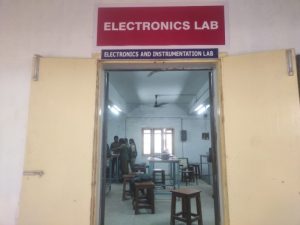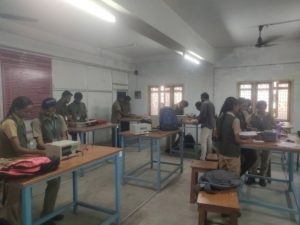I. Laboratories
Farm Machinery & Power Engineering Work Shop
The FMPE workshop is built in an area 3000 Sq.m for carrying out the practical classes for Undergraduate student. In the work shop there are different sections like carpentry & fitting, welding, Machine shop, smithing and forging etc. The students will be exposed to different classes of farm machinery in the above section. The workshop is also utilized to carry out the students project work, research work with the help of skilled artisans.
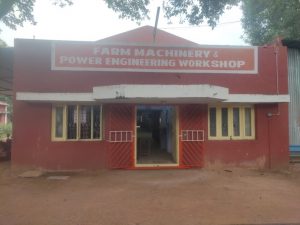 Farm Machinery Workshop
Farm Machinery Workshop
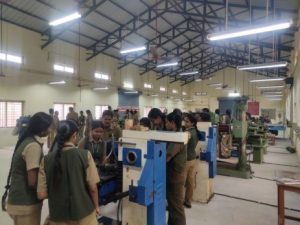
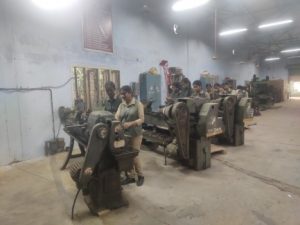
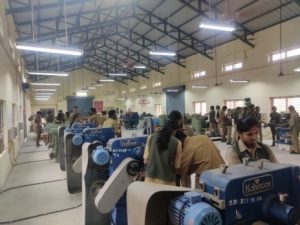
Machine Shop
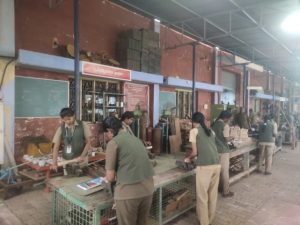
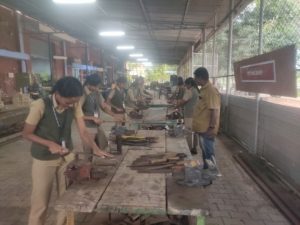
Carpentry Shop Fitting Shop
Smithy and forging workshop
The smithy laboratory is one of the basic laboratories. The lab is equipped with furnace for heating metal, tools and other equipment used in hand forging like an anvil, different hammers, sewage block, tongs, chisels, fullers, etc., Here students get trained with basic heating of a metal stock to a desired temperature, to enable it to obtain sufficient plasticity, followed by the operations like hammering, bending, pressing etc.,
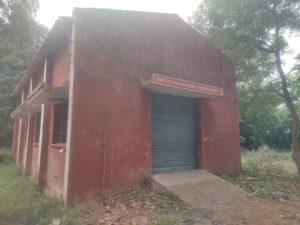
Smithy and Forging workshop
THEORY OF MACHINES LAB
In this laboratory the undergraduate students are taught the relative motion between the various parts of a machine, and forces which act on them. This lab is equipped with many models like kinematic pair, cam analysis apparatus, slider crank mechanism, gear trains, four bar mechanism etc to impart practical knowledge on design and analysis of mechanisms for the specified type of motion in farm machines.
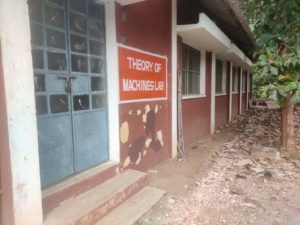
Theory of Machines lab
Tractor Engine Lab
In this laboratory the undergraduate students are taught about the working of tractor engines, gear box, clutch, Differential etc. This lab is equipped with cut section models of two stroke engine, four stroke engine, self motors etc., to show their operations and live working models to visualize for better understanding the movement of each assembly. The students are trained to dismantle and assemble the complete tractor components like engine, differential, gear box, clutch etc to have clear Knowledge about different components of a tractor.
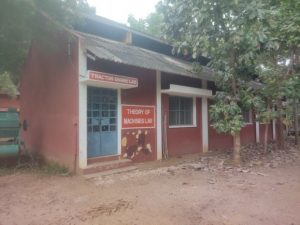
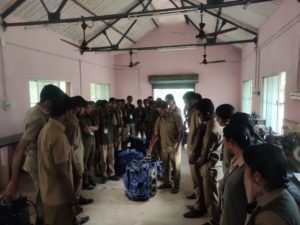
TNAU AEC&RI, KUMULUR, JOHN DEERE LEARNING CENTRE
This facility has been created with the support of M/S. John Deere Pvt. Ltd, Pune. The learning centre is a “Smart Classroom” with smart TV and also with cut-section of tractor, other parts like engine, transmission, hydraulics and other advanced technology equipment. This training centre is utilized to train faculties, technicians, students, farmers etc. so that they get knowledge on latest products and technology in area of agricultural mechanization. In this learning centre various technical sessions are conducted for engineering students, to create awareness about product sales training and sales experience. The same centre is well utilized for the students of this college to show case the working principle of the tractor.
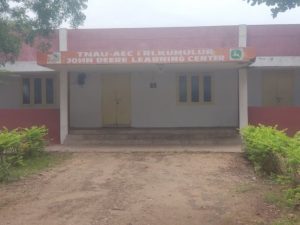
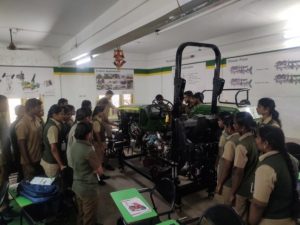
II. FARM EQUIPMENT LAB
Land Preparation Machinery
The main objective of the laboratory is to expose different types of tillage implements to the students. The laboratory is rigged with tillage implements, starting with various primary and secondary tillage, puddling, and laser leveling equipment. Students get hands-on field training in operation of individual implements. The lab has enough of the afore mentioned machines to train multiple students at the same time.
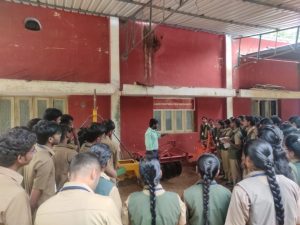
Sowing and planting Machinery
The sowing and machinery lab provides an opportunity for the students to understand different metering mechanisms, seed calibration of the seed drill, and accessing seed uniformity. Not only that, but students are trained in the field with seeders, multi-crop seeders and planters. Students can conduct experiments to find out the uniformity of seed placement in a lab using an exclusive sticky belt experimental setup.
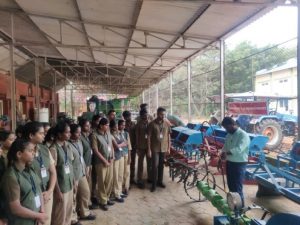
Intercultural Machinery
The intercultural machinery lab is stocked with a variety of weeders, ranging from 0.5 hp to 8 hp. Self-propelled weeders, manual to tractor-attached weeders. This lab provides an opportunity for students to get hands –on experience in the operation, repair and maintenance of different weeders.
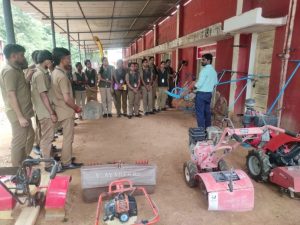
Plant Protection Equipment Laboratory
The plant protection lab is equipped with up-to-date sprayers. The lab is furnished with different types of sprayers across the power sources. The lab is equipped with small to big sprayer up to 500 lit boom sprayer for field and orchard spraying. This lab provides an opportunity for the students to get hands-on experience in the operation, repair, maintenance, and safety measures of different sprayers. Students can conduct experiments and measure spray droplet pattern and size distribution, for different nozzles, using a spray patternator setup.
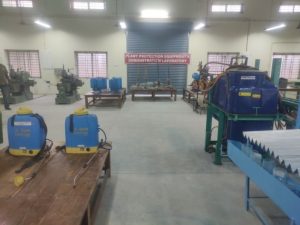
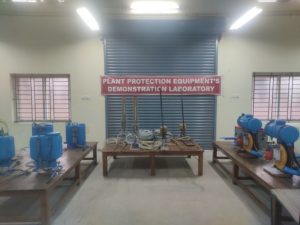
Harvesting Machinery
The harvesting machine laboratory is furnished with diverse harvesters for various agriculture crops. The lab is decked out with crop-specific harvesters, starting with cereals, pulses, millets and root crops. The lab has a unique self-propelled paddy combine.
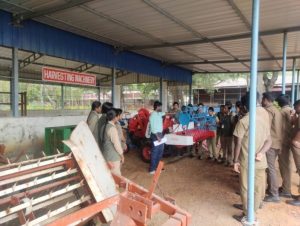
III. FIELD LAB
Rectangular and circular Soil Bin
Rectangular and circular soil bin is a test facility for studying soil dynamics, specifically on soil-machine interaction research in the laboratory. The soil bin can better represent the condition of a tool moving in linear motion in a field operation. The soil bin featured fixed soil containers and a moving carriage. The soil containers were designed to enable quick soil preparation and testing different soil types in one test run. An electric motor had been fixed at one end of the soil bin. A moving carriage having implement is towed by the electric motor via a rope and pulley system. The force required to pull the implement is measured in the soil bin.
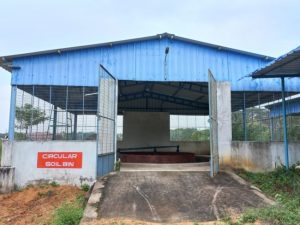
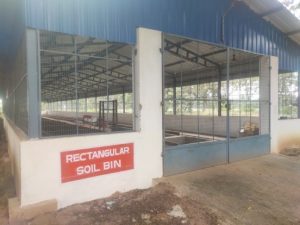
Farm Machinery Testing Centre
To test agricultural machinery manufactured within the country or imported with a view to assess their functional suitability and performance reliability so that it will help farmers and other prospective users in determining the comparative performance of machines available in market, provide material to engineers and extension workers for guiding the users in proper selection of equipment, form the basis for standard specification to be used by the manufacturers and distributors and help financial institutions in recommending financial assistance both to the manufacturers as well as farmers. So far 101 implements were tested at this Testing centre.
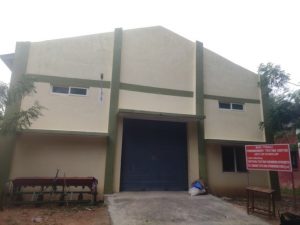
Electrical Laboratory
The electrical laboratory connects the student’s theoretical reality with practical applications. The lab has installed with different DC motors, DC generators and AC induction motor at varying capacity to enable students access the internal and external characteristic of motors. The necessary devices for measuring volt, current, load and torque are available. Exclusive wiring set ups are available to get practiced with different types of wiring. Different types of starter and their construction is displayed to get familiarized with the concepts.
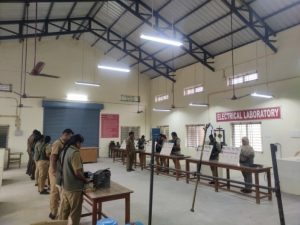
Electronics Laboratory
The electronics Laboratory is facilitated with basic measuring instruments where students perform basic experiments and get practical training in circuit design using amplifiers, diodes, and transistors. Devices for the completion of electronic circuits, like DC voltage sources, and oscilloscopes of AC voltage, as well as voltage and current measuring devices are available. Different types of transducer experiment models are available for students to conduct experiments and become acquainted with the application of transducers in agricultural measurement systems.
